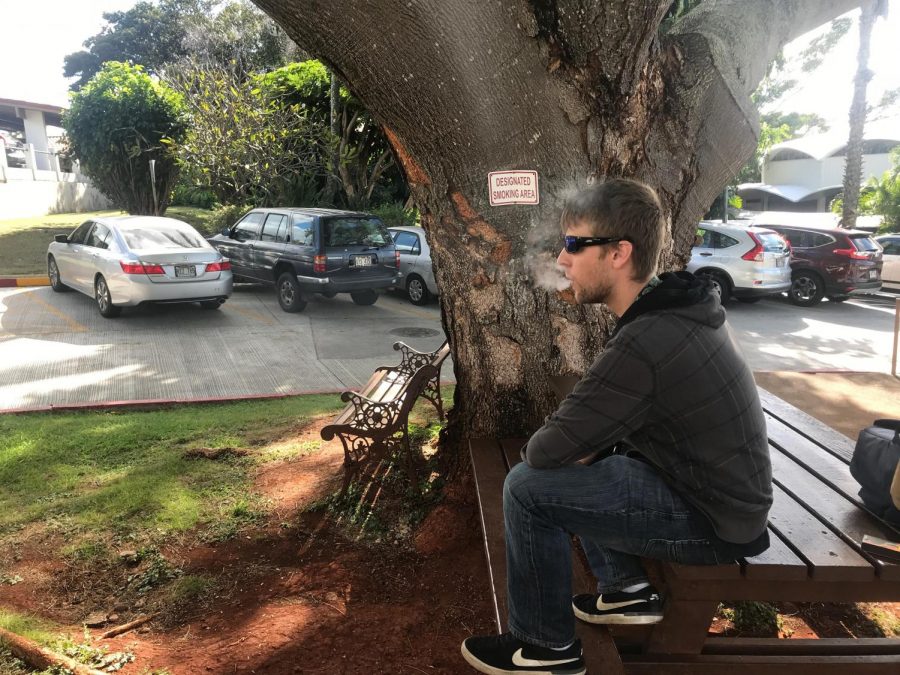CUH Struggles With Tobacco, E-Cigarette Policy
One of the two smoking areas outside of Eiban Hall that will be taken away when the tobacco, e-cigarette policy is implemented
Dr. Tracy Trevorrow, Ph.D., a department of psychology professor, has drafted a proposal to make Chaminade completely tobacco and e-cigarette free.
A grant rewarded to Chaminade by the Truth Initiative Tobacco-Free College Program will aid in Chaminade University of Honolulu becoming a tobacco-free campus by Fall 2019. Truth is one of the largest and most successful youth prevention campaigns and since 2015, Truth Initiative has funded 171 colleges to become 100% smoke or tobacco-free, according to the Truth organization.
“We are prepared to continue to provide resources and assistance to students that wish to stop smoking,” stated Trevorrow in an October interview.
In Fall 2013, Trevorrow, who works in the medical psychology department and heads up the sleep deprivation and smoking surveys at Chaminade, drafted The Tobacco-Free Policy Proposal that would prohibit the use of “tobacco products by all persons, including students, faculty, staff, contractors, and visitors on the main Honolulu campus and at all Chaminade properties. Tobacco products are not to be used in indoor or outdoor spaces, including parking lots, dormitory space, courtyards and athletic fields. … Prohibited tobacco products include, but are not limited to, cigarettes, clove cigarettes, e-cigs, pipes, water pipes, hookahs, chewing tobacco, snuff, snus, cigars, cigarillos, and dissolvable tobacco.”
Five years later, this is not a finalized policy yet and it is back on the table for consideration. CUH is mostly tobacco- and e-cigarette-free with a few exceptions. Chaminade’s current smoking policy “does not permit any person under the age of 21 to possess or use tobacco products and/or e-cigarettes on its campus or residence halls,” although there are a few designated smoking areas.
The reason for the delay in making Chaminade a completely smoke-free campus has to do with implementing the policy.
“We didn’t have the same support when the policy first came about as we do now,” stated Trevorrow when asked this in an October interview about the delay for implementing the tobacco-free policy in 2013.
However, in the fall of 2019, Chaminade is expected to be fully tobacco and e-cigarette free. That means that the few designated smoking areas will be removed from campus. There are two designated smoking areas on campus currently, the main one being directly next to Eiben Hall.
This, though, has angered some students who openly question why Chaminade is forbidding the use of products that are legal for them to use.
“They are wanting to control things that they don’t need to,” said Cameron Ng, a sophomore majoring in criminal justice who is not a smoker. “It’s a personal choice to smoke or not to smoke.”
Chaminade is not the only school to have implemented major changes to a smoking policy in recent years.
On July 10, all University of Hawaiʻi campuses and facilities became tobacco-free, joining more than 2,000 U.S. universities and colleges in an effort to provide a healthy environment for all students, faculty and staff.
Hawaiʻi state law now prohibits the use of tobacco products on all 10 UH campuses and university-owned facilities.
The FDA has declared an epidemic of e-cigarette use by adolescents and young adults, the agency announced in late September.
The FDA went on to say, about 10 percent of people aged 18 to 24 years smoked cigarettes in 2017, down from 13 percent in 2016.
According to USA Today, it would be heralded as a public health success if so many young people weren’t becoming addicted to nicotine through electronic cigarettes, or vaping.
“The reason I smoke e-cigarettes is because I think it is much less invasive than cigarette smoke and it smells better,” said Jack, a CUH junior majoring in business, who is a smoker and asked that his last name be withheld for privacy.
While experts have seen the use of tobacco drop in the last decade by 10 percent, the use of e-cigarettes has skyrocketed. Twelve percent of Chaminade students use e-cigarettes, and while that may not seem like a lot, the use of cigarettes dropped from 12 percent to 3 percent in the last eight years, Trevorrow said.
Trevorrow promises that this policy will not blindside students on the Chaminade campus.
“I think it’s a stepwise process where a lot of things need to happen before you just announce, ‘OK, nobody is allowed to smoke on campus,’” Trevorrow said to The Silversword in a 2016 interview. “That wouldn’t be fair to anyone who are smokers. They need to be able to have a chance to come to terms with the policy change and to be able to adjust their smoking or try and quit smoking, which I ultimately hope to be the case.”










